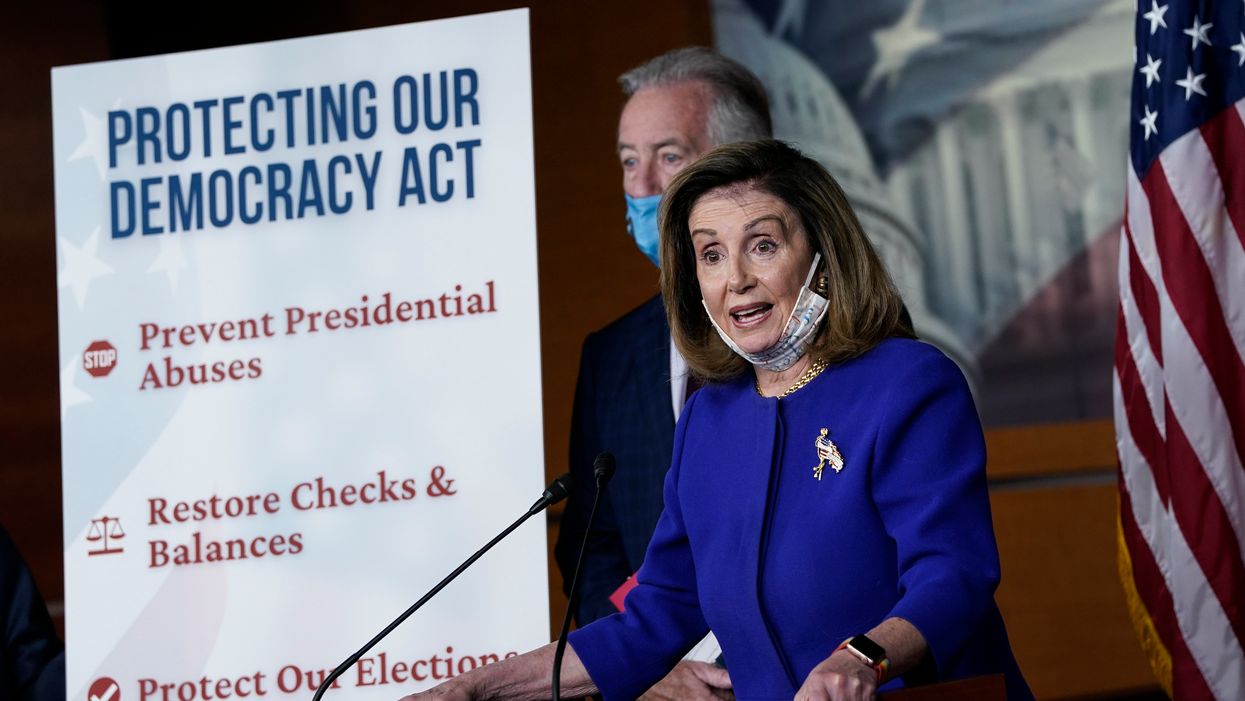House Democrats on Wednesday unveiled a democracy reform plan, focused on a rebalancing of power to bolster Congress at the expense of the presidency, signaling it will be an early priority if their party wins control of both the White House and the entire Capitol this fall.
The legislative outline was compiled without any input from Republicans, underscoring its purpose at least in the short term as a campaign messaging manifesto.
But the plan nonetheless makes clear that Democrats would seek to move swiftly in a Joe Biden administration to reverse many of what they see as a sweeping collection of checks-and-balances abuses by President Trump.
"These reforms are necessary not only because of the abuses of this president, but because the foundation of our democracy is the rule of law and that foundation is deeply at risk," the seven House committee chairmen who assembled the package said in a statement. "Our democracy is not self-effectuating — it takes work and a commitment to guard it against those who would undermine it, whether foreign or domestic."
The proposals, all of them direct responses to Trump's varied ways of challenging democratic norms over the past four years, include:
- Curbing the president's powers to grant pardons and declare national emergencies.
- Tightening ethics rules to prevent federal officials from using their government jobs to enrich themselves.
- Creating a streamlined system for federal courts to referee subpoena disputes between the executive and legislative branches.
- Strengthening protections for government whistleblowers and the supposed-to-be-independent inspectors general at departments and agencies.
- Limiting White House involvement in law enforcement decision-making at the Justice Department.
- Enhancing laws requiring executive branch officials to spend money the way Congress appropriated and barring them from overt political activities.
- Bolstering safeguards against foreign interference in elections, in part by making candidates report such meddling to the FBI.
- Exempting a president's or vice president's time in office from the statute of limitations for any federal crime.
Democrats said their package is designed as a complement to, and not a replacement for, the sweeping election administration, campaign finance and government ethics legislation the House passed last year.
Known as HR 1, it would have faced a Trump veto had it not immediately died in the Republican Senate — and this new package would as well, which is why its prospects are entirely reliant not only on Joe Biden winning the presidency but also on his party taking over the Senate by winning at least three seats.
If that happens, the Democrats would be positioned to advance the most comprehensive set of fix-the-system proposals in the 45 years since Watergate forced the resignation of President Richard Nixon, although probably not without ending the GOP minority's power to block legislation in the Senate.
The plan was assembled before Justice Ruth Bader Ginsburg died last week and Trump quickly secured almost unified GOP support for rushing her Supreme Court replacement to confirmation this fall — highlighting the way the Senate has all but abandoned its role as a deliberative body in favor of a more parliament-like posture and raising fresh balance-of-power questions about the future of such matters as the legislative filibuster and presidential dominance over the federal courts.
Progressive good-government groups rushed to embrace the package, while Republicans on Capitol Hill and the more bipartisan democracy reform organizations essentially ignored it.
It was introduced almost exactly a year after Speaker Nancy Pelosi announced the House would pursue Trump's impeachment, an effort which ended in his acquittal by the Senate — and which has almost no resonance in a presidential campaign that's now largely focused on the administration's management of the coronavirus and an economy crippled by the pandemic.
Pelosi unveiled the bill along with the seven gavel-holders: California's Adam Schiff of the Intelligence Committee, New York's Jerrold Nadler (Judiciary), New York's Carolyn Maloney (Oversight and Reform), Kentucky's John Yarmuth (Budget), California's Zoe Lofgren (House Administration), New York's Eliot Engel (Foreign Affairs) and Massachusetts' Richard Neal (Ways and Means).




















